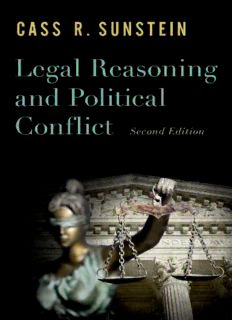
Legal Reasoning and Political Conflict PDF
Preview Legal Reasoning and Political Conflict
Legal Reasoning and Political Conflict Legal Reasoning and Political Conflict SECOND EDITION C R. s ass unstein 1 1 Oxford University Press is a department of the University of Oxford. It furthers the University’s objective of excellence in research, scholarship, and education by publishing worldwide. Oxford is a registered trademark of Oxford University Press in the UK and certain other countries. Published in the United States of America by Oxford University Press 198 Madison Avenue, New York, NY 10016, United States of America. © Oxford University Press 2018 First Edition published in hardback, 1996 First Edition published in paperback, 1998 Second Edition published in hardback, 2018 All rights reserved. No part of this publication may be reproduced, stored in a retrieval system, or transmitted, in any form or by any means, without the prior permission in writing of Oxford University Press, or as expressly permitted by law, by license, or under terms agreed with the appropriate reproduction rights organization. Inquiries concerning reproduction outside the scope of the above should be sent to the Rights Department, Oxford University Press, at the address above. You must not circulate this work in any other form and you must impose this same condition on any acquirer. Library of Congress Cataloging- in- Publication Data Names: Sunstein, Cass R., author. Title: Legal reasoning and political conflict / Cass R. Sunstein. Description: Second edition. | New York : Oxford University Press, 2018. | Includes bibliographical references and index. Identifiers: LCCN 2017037997 | ISBN 9780190864446 ((hardback) : alk. paper) Subjects: LCSH: Law—Methodology. | Law—Political aspects. | Law—United States— Methodology. | Law—Political aspects—United States. Classification: LCC K213 .S86 2017 | DDC 340/.11—dc23 LC record available at https://lccn.loc.gov/2017037997 9 8 7 6 5 4 3 2 1 Printed by Edwards Brothers Malloy, United States of America Note to Readers This publication is designed to provide accurate and authoritative information in regard to the subject matter covered. It is based upon sources believed to be accurate and reliable and is intended to be current as of the time it was written. It is sold with the understanding that the publisher is not engaged in rendering legal, accounting, or other professional services. If legal advice or other expert assistance is required, the services of a competent professional person should be sought. Also, to confirm that the information has not been affected or changed by recent developments, traditional legal research techniques should be used, including checking primary sources where appropriate. (Based on the Declaration of Principles jointly adopted by a Committee of the American Bar Association and a Committee of Publishers and Associations.) You may order this or any other Oxford University Press publication by visiting the Oxford University Press website at www.oup.com. For Rian CONTENTS Preface ix Introduction: Law Amid Diversity 3 1. Reasoning and Legal Reasoning 13 2. Incompletely Theorized Agreements 35 3. Analogical Reasoning 61 4. Trimming 101 5. Understanding (and Misunderstanding) the Rule of Law 117 6. In Defense of Casuistry 139 7. Without Reasons, Without Rules 155 8. Adapting Rules, Privately and Publicly 167 9. Interpretation 185 Conclusion: Law and Politics 219 Notes 225 Index 241 PREFACE Here’s how Charles Dickens, the greatest novelist in the English language, con- cluded a preface to one of his novels: Of all my books, I like this the best. It will be easily believed that I am a fond parent to every child of my fancy, and that no one can ever love that family as dearly as I love them. But, like many fond parents, I have in my heart of hearts a favourite child. And his name is DAVID COPPERFIELD. This is certainly not a novel, and no writer should compare himself with Dickens, but of my books, this is the one I like the best. It is my favorite child. Social order, peace, and security are miracles. Most people live together on peaceable terms, notwithstanding disagreements about the most fundamental matters, including religion, morality, and politics. Many people would like to have more goods, money, and time than they now do, and yet they channel that desire into productive rather than destructive directions. Some people are also drawn to crime, including violence, but most of them refrain. When they act out, there is an excellent chance that they will be stopped or punished. Since World War II, there have been many upheavals, and intense political disagreements, in liberal democracies, including the United States, the United Kingdom, Germany, Sweden, Denmark, Ireland, and France. All the while, the legal systems in those nations have continued to do their work. Courts have func- tioned. Most disputes are resolved peaceably (not all, but most). People live and work together. Maybe they do not love each other. Maybe they do not even like each other. But most of the time, they respect the law, and in that sense, they end up respect- ing each other, or at least acting as if they do.
Description: